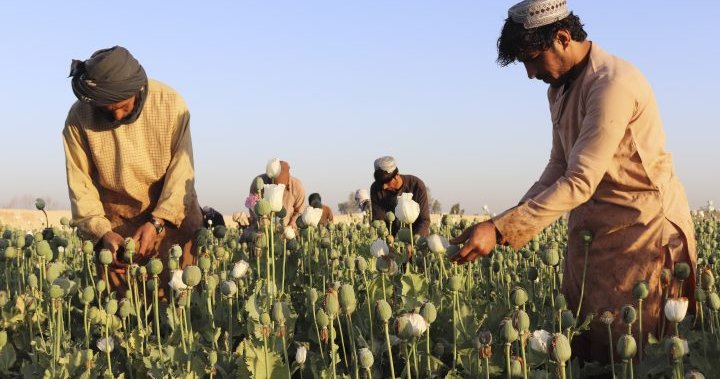
Taliban bans poppy production in Afghanistan as it clamps down on narcotics
Global News
The ban is reminiscent of the Taliban's previous rule in the late 1990s when the religion-driven movement outlawed poppy production.
Afghanistan‘s ruling Taliban announced a ban Sunday on poppy production, even as farmers across the country began harvesting the bright red flower that produces the opium used to make heroin.
The order warns farmers that their crops will be burned and they can be jailed if they proceed with the harvest. The ban is reminiscent of the Taliban’s previous rule in the late 1990s when the religion-driven movement outlawed poppy production. At that time, the ban was staggered and implemented countrywide within two years. The U.N. verified that production had been eradicated in most of the country.
However, after their ouster in 2001 farmers in many parts of the country reportedly plowed over their wheat fields – which had been almost impossible to bring to market because of the lack of roads and infrastructure – and returned to poppy production.
During the last years of the Taliban rule, wheat was rotting in fields because the farmers were unable to bring it to market to be sold and ground into flour.
Poppies are the main source of income for millions of small farmers and day laborers who can earn upwards of $300 a month harvesting them and extracting the opium.
Today, Afghanistan is the world’s largest producer of opium and in 2021, before the Taliban takeover, produced more than 6,000 tons of opium, which a report from the U.N. Office on Drugs and Crime said could potentially yield 320 tons of pure heroin.
Afghanistan produces more opium than all opium-producing countries combined and last year was the sixth straight year of record opium harvests. That’s the case even as the U.S. and international community was spending billions of dollars to eradicate poppy production. The Taliban reportedly made millions of dollars charging taxes on farmers and middle men to move their drugs outside Afghanistan and senior officials of the U.S.-backed government were implicated in the flourishing drug trade.
Washington spent more than $8 billion trying to eradicate poppy production in Afghanistan during its nearly 20-year war, which ended with the return of the Taliban in August.
